French startup raises funding to develop solar sails
Saturday, 26 March 2022 21:52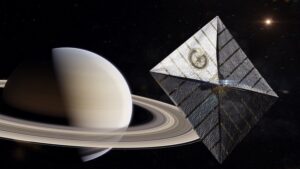
A French startup has raised an initial round of funding to begin testing of solar sails it believes can sharply reduce the cost of deep space missions.
The post French startup raises funding to develop solar sails appeared first on SpaceNews.
Intelsat rolls out network service that integrates Starlink and geostationary satellites
Saturday, 26 March 2022 19:53
Satellite operator Intelsat is offering a managed network service that integrates geostationary satellites, SpaceX’s Starlink low Earth orbit constellation and cellular broadband.
The post Intelsat rolls out network service that integrates Starlink and geostationary satellites appeared first on SpaceNews.
FAA again delays completion of Starship environmental review
Saturday, 26 March 2022 15:40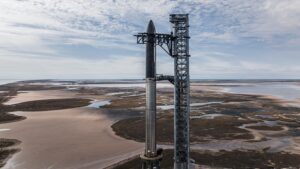
The FAA has again delayed completion of an environmental assessment for orbital launches of SpaceX’s Starship vehicle from Texas, although it may have no effect on near-term launch plans.
The post FAA again delays completion of Starship environmental review appeared first on SpaceNews.
SLS test could delay Crew Dragon launch
Friday, 25 March 2022 23:57
A practice countdown for NASA’s Space Launch System could cause a delay in the launch of a commercial mission to the International Space Station, a move with potential ripple effects for other missions to the station.
Terran Orbital stock cleared for trading on NYSE
Friday, 25 March 2022 22:16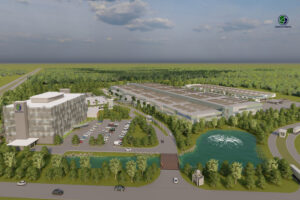
Shares in satellite manufacturer Terran Orbital Corp. were cleared to begin trading Monday on the New York Stock Exchange under the ticker symbol LLAP, Live Long and Prosper
The post Terran Orbital stock cleared for trading on NYSE appeared first on SpaceNews.
Additional funding unlikely to accelerate commercial space station projects
Friday, 25 March 2022 22:12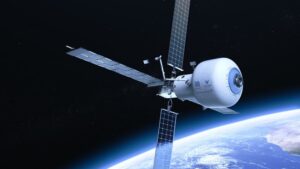
WASHINGTON — Companies developing commercial space station concepts for NASA say they’re working as fast as they can and that additional funding would not speed up their work significantly amid concerns about the long-term viability of the International Space Station.
Space Force using Spire data to detect satellite jamming
Friday, 25 March 2022 21:33
Spire is providing GPS telemetry data to help detect jamming as part of a project run by the U.S. Space Systems Command
The post Space Force using Spire data to detect satellite jamming appeared first on SpaceNews.
Week in images: 21 - 25 March 2022
Friday, 25 March 2022 13:10
Week in images: 21 - 25 March 2022
Discover our week through the lens
Tiny satellites are changing the way we explore our planet and beyond
Friday, 25 March 2022 11:52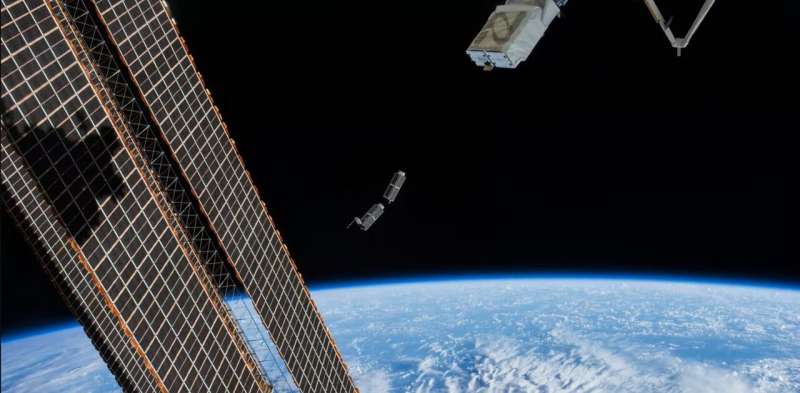
Want to go to space? It could cost you.
This month, the SpaceX Crew Dragon spacecraft will make the first fully-private, crewed flight to the International Space Station. The going price for a seat is US$55 million. The ticket comes with an eight-day stay on the space station, including room and board—and unrivaled views.
Virgin Galactic and Blue Origin offer cheaper alternatives, which will fly you to the edge of space for a mere US$250,000–500,000. But the flights only last between ten and 15 minutes, barely enough time to enjoy an in-flight snack.
But if you're happy to keep your feet on the ground, things start to look more affordable. Over the past 20 years, advances in tiny satellite technology have brought Earth orbit within reach for small countries, private companies, university researchers, and even do-it-yourself hobbyists.
Science in space
We are scientists who study our planet and the universe beyond. Our research stretches to space in search of answers to fundamental questions about how our ocean is changing in a warming world, or to study the supermassive black holes beating in the hearts of distant galaxies.
Webb's infrared universe
Friday, 25 March 2022 11:30 Video:
00:01:00
Video:
00:01:00
The James Webb Space Telescope (Webb) will observe the Universe in the near-infrared and mid-infrared – at wavelengths longer than visible light.
By viewing the Universe at infrared wavelengths with an unprecedented sensitivity Webb will open up a new window to the cosmos. With infrared wavelengths it can see the first stars and galaxies forming after the Big Bang. Its infrared vision also allows Webb to study stars and planetary systems forming inside thick clouds of gas and dust that are opaque to visible light.
The primary goals of Webb are to study galaxy, star and planet formation
Blow a Cosmic Kiss
Friday, 25 March 2022 09:39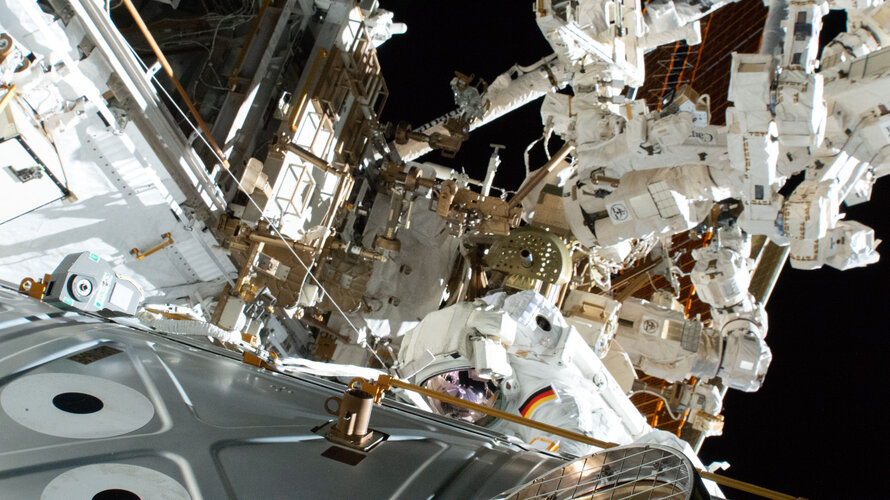 Image:
Image:
We spy from way up high an ESA astronaut dangling from the International Space Station.
Matthias Maurer performed his first spacewalk during his Cosmic Kiss mission yesterday with fellow astronaut Raja Chari of NASA. Extravehicular activity or EVA 80 lasted 6 hours and 54 minutes and was not without some excitement.
An hour into the spacewalk, the camera and light assembly on Matthias’ helmet needed some readjustments, which Raja was able to fix using some wiring. The duo were then able to carry on with the tasks, which included installing hoses on a radiator beam valve module that helps regulate Space
On icy moon Enceladus, expansion cracks let inner ocean boil out
Friday, 25 March 2022 08:56 In 2006, the Cassini spacecraft recorded geyser curtains shooting forth from "tiger stripe" fissures near the south pole of Saturn's moon Enceladus - sometimes as much as 200 kilograms of water per second. A new study suggests how expanding ice during millennia-long cooling cycles could sometimes crack the moon's icy shell and let its inner ocean out, providing a possible explanation for the gey
In 2006, the Cassini spacecraft recorded geyser curtains shooting forth from "tiger stripe" fissures near the south pole of Saturn's moon Enceladus - sometimes as much as 200 kilograms of water per second. A new study suggests how expanding ice during millennia-long cooling cycles could sometimes crack the moon's icy shell and let its inner ocean out, providing a possible explanation for the gey Space X's Crew-4 Dragon capsule named 'Freedom'
Friday, 25 March 2022 08:43 Space X's fourth Dragon capsule to carry astronauts to space has been named "Freedom," bringing the name of the first capsule to fly an American into space to a new generation.
The fourth Dragon mission to carry astronauts is set to launch from NASA's Kennedy Space Center in Florida to the International Space Station on April 19.
The mission was originally slated to launch on Apr
Space X's fourth Dragon capsule to carry astronauts to space has been named "Freedom," bringing the name of the first capsule to fly an American into space to a new generation.
The fourth Dragon mission to carry astronauts is set to launch from NASA's Kennedy Space Center in Florida to the International Space Station on April 19.
The mission was originally slated to launch on Apr Earth from Space: Carrara, Italy
Friday, 25 March 2022 08:00
The Copernicus Sentinel-2 mission takes us over Carrara – an Italian city known especially for its world-famous marble.
Northrop Grumman says customers are ‘lined up’ for on-orbit satellite servicing
Thursday, 24 March 2022 21:12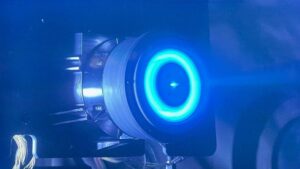
SpaceLogistics, a satellite-servicing firm owned by Northrop Grumman, last week successfully fired the electric propulsion system it is developing for the Mission Extension Pods it plans to launch in 2024.
The post Northrop Grumman says customers are ‘lined up’ for on-orbit satellite servicing appeared first on SpaceNews.

